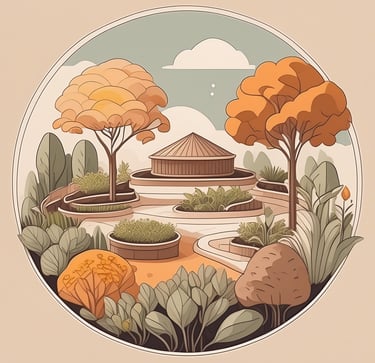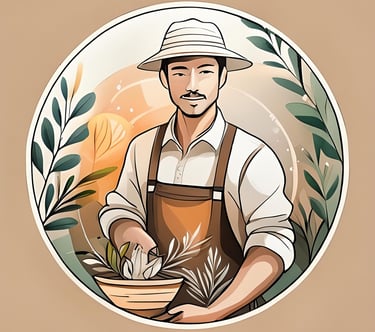

The Mental Garden
Consider a garden bed left to nature: it becomes a chaotic mix of wildflowers, weeds, and toxic plants, each fighting for survival. While some might appreciate this wildness, it's not for everyone.
Contrast this with a meticulously planned garden where every flower complements the next, and color coordination and ecosystem design enhance each plant's beauty and growth. Careful selection and removal of unwanted plants ensure that everything desired in the garden thrives with proper space and nourishment.
Reflection
1) Imagine an ideal version of yourself, what kind of thoughts does this version have on a daily basis compared to the one right now?
Example
I used to work in a toxic environment where gossip was the common norm. Over time, I caught myself talking badly about other people unconsciously, just to have something to talk about. I caught myself in the act and realized I had to deviate away from this behavior. Thus, instead, I practiced only talking about other people if I had something good to say, otherwise, I wouldn't say anything.
This is a perfect example of weed growing without tending to it. Allowing things to grow unconsciously without consciously caring for it.
The Mind
This is what I call the Mental Garden, our ideas, thoughts, advice, words, sounds, feelings, emotions anything that goes through the mind is the garden.
If one is not careful what kind of ideas are being fostered in the garden, the idea begins to grow over time. It could be an idea that’s toxic to its surroundings, or it could be an idea of great fortune, but other weeds are suffocating its growth. Thus, never allowing the plant to fully flourish and bloom to what it is.
Whether one has a plan for what ought to be grown in the garden or not does not matter in the flow of life. If it is not cared for, others will grow their plants and crops in the garden. In other words, if one does not possess a desire, or a goal to tend for the garden, other people can come and plant their goals, values, and ideas to enrich their own lives.
The bottom line: If one does not use it, someone else will.
It all depends on the desire of the individual, if one is happy by passively offering their garden beds for others to grow their riches, then so be it. After all, nature grows perfectly fine by itself and does not need any care from any mediator for it to prosper. On the other hand, actively maintaining the garden allows one to live and experience life in a more personalized manner.
If one enjoys apples and despises pears, why plant pears when one can plant apples?
The Gardener
Knowledge, habit, and wisdom are inherited through history. Some inherit behaviors that are largely successful due to the past wisdom acquired within a family tree. However, one is not doomed if the knowledge is lackluster.
One is not defined by where one starts but rather ends. Within the opportunities of living, anyone has the potential to learn and overcome any challenges if the desires are there. Thus, being conscious of one's garden is the first step in planning the garden to one’s desire. Along the way, whatever is desired will reveal the wisdom necessary for one’s journey.
Old habits, habits of unknown such as improper cutting methods could cause further damage to plants; as opposed to, proper methods which stimulate growth in plants. In other words, when a good idea is present, one could have a bad habit of pushing it away, doubting the idea; thus, destroying any plants that are beneficial for the garden.
It becomes crucial to identify which habits, knowledge, and wisdom servers the development of the desired garden. In other words, which mental state is desired? A mind that’s clear of its values, behaviors that are clear of its virtues, and habits that align with the desired garden.




